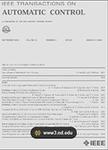版权所有:内蒙古大学图书馆 技术提供:维普资讯• 智图
内蒙古自治区呼和浩特市赛罕区大学西街235号 邮编: 010021

作者机构:Kunming Univ Sci & Technol Fac Mech & Elect Engn Yunnan Key Lab Intelligent Control & Applicat Kunming 650500 Peoples R China Univ Macau Dept Electromech Engn Macau 999078 Peoples R China
出 版 物:《IEEE TRANSACTIONS ON AUTOMATIC CONTROL》 (IEEE Trans Autom Control)
年 卷 期:2025年第70卷第5期
页 面:3518-3525页
核心收录:
学科分类:0808[工学-电气工程] 08[工学] 0811[工学-控制科学与工程]
基 金:National Natural Science Foundation of China [62273169, 62433012, 62373174, 62203194] Yunnan Fundamental Research Projects [202201AW070005] Science and Technology Development Fund of Macau SAR [0091/2023/AMJ]
主 题:Adaptive parameter estimation (APE) optimal es-timation optimality principle persistent excitation (PE) persistent excitation (PE) persistent excitation (PE)
摘 要:It has been well known that the learning gain plays a crucial role in the adaptive parameter estimation (APE) for guaranteeing fast convergence and robustness. However, the tuning of learning gains in the existing methods is generally empirical and time-consuming. To address this issue, this article presents a novel APE approach to explore the optimality principle in the design of adaptive laws to obtain an online updated optimal learning gain, which is derived to minimize a cost function of estimation error with two weighting matrices. For this purpose, the estimation error is first reconstructed by using filter operations on the system and introducing several auxiliary variables. Then, two constructive APE algorithms driven by the extracted estimation error are developed. Finally, inspired by the duality of control and estimation, the estimation error dynamics are reformulated as a closed-loop system with an analogous control action to minimize the cost function. By using the Hamiltonian function, a differential Riccati equation is derived to find an optimal solution of learning gain to construct an optimal adaptive law. The robustness of the proposed adaptive laws subjected to disturbances is also analyzed. Comparative numerical simulations are given to illustrate the superiority of the proposed method.